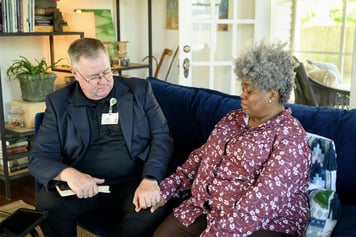People living with congestive heart failure (CHF) often experience symptoms that can interfere with their quality of life. CHF is a progressive condition, meaning it slowly gets worse over time. As this happens, it’s common to notice worsening heart failure symptoms. If you have been diagnosed with CHF, you may be wondering what to expect in the final stages of this illness. Knowing the symptoms of end-stage heart failure can help you and your loved ones prepare for this final phase of life, and to discuss your goals for treatment and managing symptoms.
What Are the Stages of Heart Failure?
According to the Centers for Disease Control (CDC), heart failure affects around 6.2 million adults in the United States. The diagnosis is marked by four stages, as defined by the American College of Cardiology and the American Heart Association. These stages are as follows:
- Stage A — At risk for heart failure, but without signs or symptoms of disease
- Stage B — Pre-heart failure, without symptoms but with known heart abnormalities
- Stage C — Symptomatic heart failure, either currently or in the past
- Stage D — Advanced (or end-stage) heart failure, with symptoms that interfere with quality of life or cause multiple hospital stays
How Long Can You Live with Congestive Heart Failure?
For someone living with congestive heart failure, there are many things that affect life expectancy, including genetics, assigned gender at birth, age, current stage of the diagnosis and more. There are also ways to extend life expectancy with this diagnosis, including medications and healthy lifestyle habits. However, there is not a cure for CHF, and once diagnosed, it is a chronic, lifelong condition.
Research from a 2015 study suggests that overall, people with congestive heart failure have a life expectancy that is around 10 years shorter than average. Survival rates for stage D, or end-stage heart failure, are low: one study notes a median life expectancy of 6-12 months.
What Are the Symptoms of End-Stage Heart Failure?
During end-stage heart failure, symptoms are more difficult to manage and affect a person’s quality of life significantly. Doctors often describe heart failure symptoms based on a classification system, called the New York Heart Association (NYHA) functional classification. Like the stages of heart failure, there are four categories:
- Class I — no limitations to ordinary activities
- Class II — slight symptoms during moderate activity
- Class III — symptoms during activities of daily living (but not at rest)
- Class IV — uncomfortable symptoms during any level of activity and symptoms present at rest
People living with end-stage heart failure experience symptoms that fall into the Class IV NYHA category. This is because at this stage, the function of the heart muscle is severely weakened, causing difficulty with pumping blood effectively and leading to fluid buildup in the body. Common symptoms include:
Severe shortness of breath
This is worsened by any kind of physical activity, to the point of being unable to tolerate activity. It can also cause discomfort at rest, and may feel worse when lying down to sleep, due to fluid buildup in the lungs.
Increased fatigue
Poor heart function and difficulty sleeping due to discomfort and shortness of breath can lead to extreme exhaustion for end-stage heart failure patients.
Worsening cough
Fluid buildup in the lungs can worsen chronic cough due to heart failure.
Swelling
Trouble with proper circulation and fluid buildup can lead to swollen legs, feet, ankles and belly. The swelling can be uncomfortable. If you press on a swollen body part, you might notice your finger leaves a dent. Along with fluid retention, rapid weight gain may occur.
Decreased appetite
Swelling in the abdomen can cause a feeling of pressure, fullness and nausea, and food intake may decrease.
Heart palpitations
Weakened heart muscle may cause arrhythmias, leading to a feeling of extra or skipped beats.
Increased urination
You may find yourself making extra bathroom trips due to fluid retention. This is especially true if you have been prescribed diuretics, a medication that helps flush excess fluid from the body.
Feelings of anxiety or “doom”
This is a common response to the combination of end-stage heart failure symptoms and their impact on well-being.
End-stage heart failure is not reversible. Treatment includes medications, left ventricular assist devices (a device that helps the heart pump more effectively), and heart transplant. For many people, palliative care may be appropriate, or they may choose hospice care if they decide not to continue invasive treatment.
What Should I Know About End-Stage Heart Failure and Signs of Dying?
End-stage heart failure can gradually worsen, or it can rapidly progress to the end-of-life stage of the disease. In some cases, it can lead to sudden cardiac death, where the heart suddenly stops. The heart will progressively weaken, which worsens the function of other body systems, such as the kidneys. These changes will appear as signs that death is near.
A person with end-stage heart failure who is beginning to experience the stages of dying will have symptoms such as:
- Decreased responsiveness
- Increased restlessness
- Difficulty speaking or moving
- Sleeping more
- Not wanting to eat or drink
- Increased confusion
- Loss of control of bodily functions
- Shallow, irregular breathing
- Hallucinations
- Cold and/or discolored feet and hands
- Decreased body temperature and blood pressure
How Can Palliative Care or Hospice Help with End-Stage Heart Failure?
Although a heart failure diagnosis can be frightening and overwhelming especially during end-stage heart failure, there are services available that can offer valuable support. Palliative care offers relief from the symptoms of chronic and serious illness and can be started at any stage of heart failure diagnosis. Your palliative care team will work with your other healthcare providers to ensure your goals of care are met, your symptoms are managed, and your emotional well-being is addressed. Palliative care can be available to help even if you seek treatment like heart transplant to extend your life.
Hospice care is for patients whose doctor has determined they are at the end stage of the disease process and have six months or less left to live if the disease takes its normal course. People living with end-stage heart failure who meet these criteria or have signs of dying can receive physical, emotional and spiritual care during this part of their life, supported by an interdisciplinary team of hospice providers. The focus of this care is pain and symptom management to maintain quality of life and stay as comfortable as possible.
When Should I Call Palliative Care or Hospice for End-Stage Heart Failure?
If you or a loved one have a congestive heart failure diagnosis or have been told they have reached end-stage heart failure, it’s never too early to ask for added support. You can seek palliative care when you are diagnosed and receive services throughout the course of this illness.
Your doctor can also help you decide if hospice care is right for you instead of palliative care. You can take our hospice quiz to guide your decision as well. No matter which choice you make, you can have greater peace of mind knowing that support to relieve symptoms of end-stage heart failure is just a call away.





